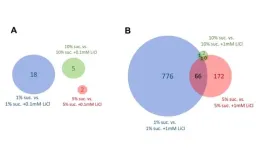(Press-News.org) Policing is a profession that features shift work and long hours, both of which can lead to insufficient sleep and fatigue. Because of the unique demands of the job, fatigue raises risks related to decision making, impulse control, driving, and other aspects of work. In a new study, researchers tested the effect of a fatigue-management program on the sleep, mental health, well-being, and safety of police employees in Seattle. The training improved sleep duration as well as various aspects of employees’ safety and well-being.
The study, by researchers at Washington State University (WSU) and the Seattle Police Department, appears in the Journal of Experimental Criminology.
“This is the first true experiment to test the effectiveness of fatigue-management training in a large urban U.S. police department,” explains Lois James, assistant dean of research and associate professor in WSU’s College of Nursing, who led the study. “Our findings can help future interventions, guide evaluations, and establish evidence-based best practices for replication or adaptation nationwide.” James is an expert whose work is promoted by the NCJA Crime and Justice Research Alliance, which is funded by the National Criminal Justice Association.
Past studies have consistently suggested that fatigue-management training can promote sleep, health, and well-being among police employees. However, all the studies used a simple pre- and post-training design, which is susceptible to selection bias and other problems. This study used a randomized control design, building on past work by using both physiological measures of sleep (wrist actigraphy) and validated survey tools to measure sleep quality, sleepiness, depression, anxiety, and symptoms of post-traumatic stress syndrome (PTSD).
Researchers evaluated the effectiveness of an eight-week, modular, online learning fatigue-management training program in the Seattle Police Department. Data collection for the study began in the fall of 2020. Of the department’s 1,300 employees, 155 completed the training; of those, 75% were officers and 25% were civilian staff. Almost three-quarters of the respondents were White and two-thirds were male; respondents’ ages ranged from 25 to 54 years old. Participants worked a variety of shifts, with about 35% working from 9 am to 5 pm and the rest working night, longer day, or evening shifts.
Participants were randomly assigned to either a treatment group (employees who took part in the training) or a control group (employees who were on a waiting list to receive the training after the conclusion of the experiment). Those who received the training did so for eight weeks, then received follow-up testing. The program included education on practicing sleep hygiene, reducing stress, maximizing nutrition and exercise, dealing with circadian highs and lows, and countering fatigue.
The training significantly improved employees’ sleep (adding 18 minutes of sleep per 24-hour period); in contrast, employees who did not participate in the training slept 9 minutes less per 24-hour period. Although this increase might not seem large, by the end of the intervention, training participants had increased their sleep to seven hours, on average, an amount that is favorably associated with better health for adults. Sleep quality also improved, although only significantly so for participants who worked the day shift.
Treatment group participants significantly reduced the severity of their PTSD symptoms, perhaps the result of the breathing and meditation modules, the authors suggest. In addition, the training significantly lowered rates of depression and anxiety, although effect sizes were small. Finally, taking part in the training reduced employees’ likelihood of falling asleep while driving.
Among the study’s limitations, the authors note that the effects of the COVID-19 pandemic may have influenced their results in ways that were difficult to control, limiting the study’s generalizability outside of the pandemic era. The pandemic delayed implementation of the study, and conditions during the pandemic as well as in the aftermath of the police murder of George Floyd (e.g., civil unrest, increased stress by police and the public) may have influenced the study, they note.
“Our study is the first to document the effectiveness of a fatigue-training intervention in promoting police employee sleep, mental health, well-being, and safety using a randomized control trial design,” says Stephen James, assistant professor in WSU’s Elson S. Floyd College of Medicine, who coauthored the study. “Amid calls for defunding police, departmental understaffing, and police burnout, our results suggest it would be wise to explore adopting fatigue-management programs for police nationwide.”
“The training that we developed, implemented, and evaluated can reverse problems that arise as a result of police fatigue, reducing the number of employees who are on sick leave or out due to injury, and closing the understaffing gap so the community gets the services it needs,” adds Loren Atherley, senior director of performance analytics and research and senior research scientist at the Seattle Police Department, who coauthored the study.
The study was supported by the National Institute of Justice.
END
Study: Fatigue-management training improved sleep, safety, well-being for Seattle police
2024-06-20
ELSE PRESS RELEASES FROM THIS DATE:
Guiding humanity beyond the moon: OHIO’s Nate Szewczyk and students coauthor papers published in “Nature” journals that revolutionize human space biology
2024-06-20
What actually happens to the human body in space? While scientists and researchers have heavily researched how various factors impact the human body here on Earth, the amount of information available about changes that occur in the body in space is not as well-known. Scientists, including OHIO’s Nate Szewczyk and several of his trainees, have been studying for years how the body, specifically on the molecular side, changes in space. Recently, a new package of papers has been published in “Nature” journals depicting how the modern tools of molecular biology and precision medicine can help guide humanity into more challenging missions beyond where we’ve already been.
The ...
Grant supports research to identify barriers to health care for Black women
2024-06-20
A $1.58 million grant will support work by a health communication scholar at the University of Tennessee (UT) Health Science Center’s College of Nursing and a medical oncologist at West Cancer Center and Research Institute (WCCRI) to identify sociocultural and structural factors that are root causes of cancer health disparities for Black women in the Mid-South.
Assistant Professor Janeane Anderson, PhD, MPH, is a social scientist and health communication scholar at the College of Nursing whose research focuses on how interpersonal factors affect ...
Scientists at uOttawa develop innovative method to validate quantum photonics circuits performance
2024-06-20
A team of researchers from the University of Ottawa’s Nexus for Quantum Technologies Institute (NexQT), led by Dr. Francesco Di Colandreanorth_eastexternal link, under the supervision of Professor Ebrahim Karimi, associate professor of physics, has developed an innovative technique for evaluating the performance of quantum circuits. This significant advancement, recently published in the prestigious journal npj Quantum Information, represents a substantial leap forward in the field of quantum computing.
In the rapidly evolving landscape of quantum technologies, ...
New report on community-centered approach to providing vaccine education and resources to persons experiencing homelessness during COVID-19
2024-06-20
(Boston)— A community-support model for providing health resources and education is a way to continuously engage unhoused people and other underserved groups who are particularly vulnerable during health emergencies like the COVID-19 pandemic.
“Having a stable system for bringing health information to unhoused people and connecting them to providers at Boston Health Care for the Homeless Program (BHCHP), is a pathway for addressing a number of health issues they experience,” said Kareem King, Jr., research program manager at Boston University’s Clinical & Translational Science ...
Government updates race and ethnicity data collection standards: implications and insights
2024-06-20
New Rochelle, NY, June 20, 2024–The latest issue of the peer-reviewed journal Health Equity features a pivotal roundtable discussion titled “Implications and Insights on Federal Revisions to Race and Ethnicity Collection.” This roundtable assembles leading experts to explore newly revised race and ethnicity data collection standards from the Office of Management and Budget (OMB), highlighting the significant impact these changes have on policy and practice. The expanded standards now capture historically marginalized communities, ...
Dr. Vivek S. Kavadi named CEO of the American Society for Radiation Oncology (ASTRO)
2024-06-20
ARLINGTON, Va., June 20, 2024 — The American Society for Radiation Oncology (ASTRO) announced today that following a nationwide search, Vivek S. Kavadi, MD, MBA, FASTRO will become CEO of the Society effective November 1, 2024. Dr. Kavadi will succeed Laura Thevenot, who previously announced her intent to retire after leading the organization since 2002.
Dr. Kavadi, a radiation oncologist and ASTRO member since 1994, ascends to the role from his current position as Chief Radiation Oncology Officer for The ...
Dietary sucrose determines activity of lithium on gene expression and lifespan in drosophila melanogaster
2024-06-20
“[...] we found that, in female D. melanogaster, the life-prolonging effect of dietary lithium is dependent on the actual sucrose content of the medium.”
BUFFALO, NY- June 19, 2024 – A new research paper was published in Aging (listed by MEDLINE/PubMed as "Aging (Albany NY)" and "Aging-US" by Web of Science) Volume 16, Issue 11, entitled, “Dietary sucrose determines the regulatory activity of lithium on gene expression and lifespan in Drosophila melanogaster.”
The amount of dietary sugars and the administration of lithium both impact the lifespan of the fruit fly Drosophila melanogaster. It is noteworthy that lithium ...
Assessment of CEA, CA-125, and CA19-9 as adjuncts in non-small cell lung cancer management
2024-06-20
“[...] these inexpensive, widely available tests with rapid turnaround times and relatively short half-lives (CEA, CA-125, and CA19-9) are perfectly situated to serve as adjunctive clinical tools in the management of NSCLC.”
BUFFALO, NY- June 20, 2024 – A new research paper was published in Oncotarget's Volume 15 on June 13, 2024, entitled, “Assessment of serum tumor markers CEA, CA-125, and CA19-9 as adjuncts in non-small cell lung cancer management.”
Conventional tumor markers may serve as adjuncts in non-small cell lung cancer ...
Iron meteorites hint that our infant solar system was more doughnut than dartboard
2024-06-20
Key takeaways
Iron meteorites are remnants of the metallic cores of the earliest asteroids in our solar system. Iron meteorites contain refractory metals, such as iridium and platinum, that formed near the sun but were transported to the outer solar system.
New research shows that for this to have happened, the protoplanetary disk of our solar system had to have been doughnut-shaped because the refractory metals could not have crossed the large gaps in a target-shaped disk of concentric rings.
The paper suggests that the refractory metals moved outward ...
Anti-trust regulators should consider their options carefully when start-ups are acquired, new study suggests
2024-06-20
June 20, 2024
Anti-Trust Regulators Should Consider Their Options Carefully When Start-Ups are Acquired, New Study Suggests
Less Blunt Options than Banning Acquisitions May Help Preserve Innovation and Competition
Toronto - Promoting a competitive marketplace has been the main focus for regulators concerned with “killer acquisitions” -- when big companies swallow small startups to eliminate a potential rival.
But researchers and other observers point out that blocking these purchases puts something else important at risk – innovation. Startups are sometimes driven to come up with a new process or product precisely because ...




